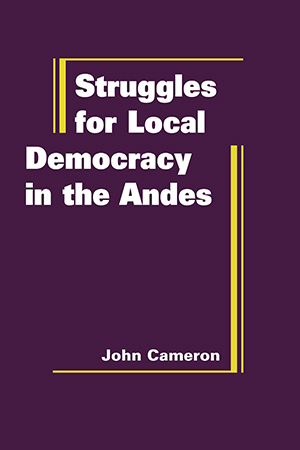John Cameron draws on power-based approaches to the study of democratization as he thoughtfully explores efforts by indigenous and peasant groups to gain control of local governments and deepen democracy in Bolivia, Ecuador, and Peru.
Cameron addresses three fundamental questions: What factors best explain the success or failure of local political movements in the Andes? What forms of democracy are emerging in indigenous- and peasant-controlled municipalities? What are the impacts of municipal democratization on the well-being and political identities of the citizenry? As he elucidates his results, he reminds readers that, in the midst of some of the most exclusionary and elite-dominated systems of local government in Latin America, political struggles for democracy are having a profound impact.
John Cameron is associate professor in the Department of International Development Studies at Dalhousie University
"An excellent book recommended to scholars interested in democracy and rural studies.... Cameron's work opens many avenues for new research on local democracies in the Andes."—Leonith Hinojosa, Mountain Research and Development
"A very valuable contribution to understanding the intricacies of contemporary politics across the Andean region."—Amy Mortensen, Bulletin of Latin American Research
"A unique and seminal contribution to the study of contemporary participatory democracy and rural development in the area.... Cameron's ... work is so rich that it provokes new questions and suggests new directions that will keep scholars busy for years to come."—Amalia Pallares, Perspectives on Politics
"Cameron’s richly detailed comparative case studies are highly recommended for those interested in local democracy, rural development, and indigenous politics. "—Choice
"Remarkably rich and insightful.... All who wish to understand local politics in Latin America, especially in its ethnically diverse regions, must read this work."—Liisa North, York University
"An impressive piece of scholarship ... consistently clear and effective."—Kent Eaton, University of California Santa Cruz






